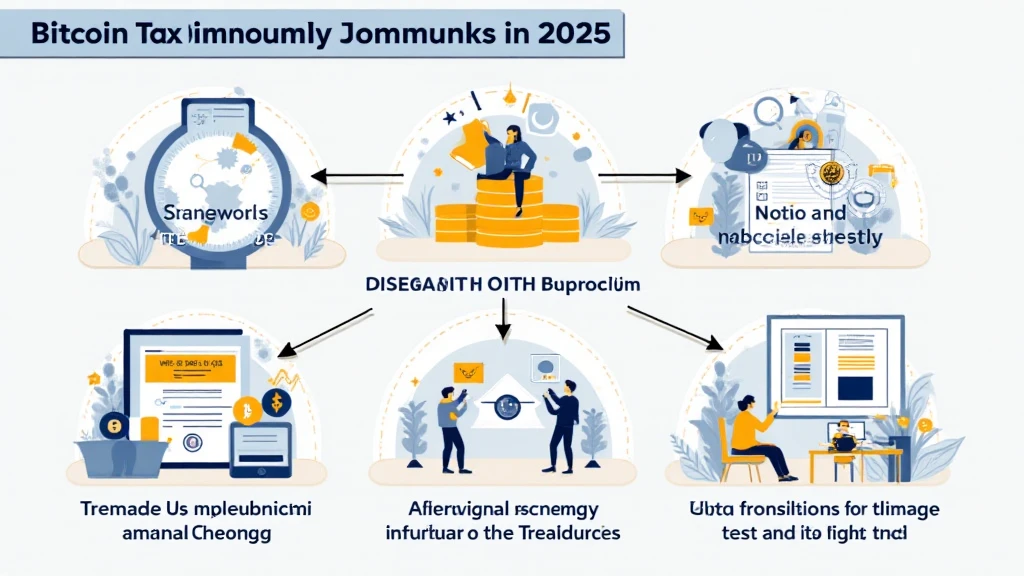
Bitcoin Tax Compliance Frameworks: Essential Insights for 2025
With more than $4 billion lost in DeFi hacks in 2024, the need for robust tax compliance frameworks has never been more pressing. As cryptocurrencies like Bitcoin continue to gain traction globally, including in emerging markets like Vietnam, understanding how to navigate the complex landscape of tax regulations is crucial for both individuals and enterprises. This article aims to explore effective Bitcoin tax compliance frameworks, focusing particularly on the evolving landscape of 2025.
Understanding the Importance of Bitcoin Tax Compliance
Tax compliance is not just a legal obligation; it is part of a broader commitment to operating within the financial system’s bounds. For Bitcoin users and businesses, the stakes are high. The Internal Revenue Service (IRS) in the U.S. and various tax authorities worldwide are increasingly scrutinizing cryptocurrency transactions.
- Over 80% of countries now have some regulatory framework regarding cryptocurrency taxation.
- In Vietnam, user growth rates for cryptocurrencies surged by 29% from 2022 to 2023, amplifying the need for compliance protocols.
So, what does Bitcoin tax compliance entail? At its core, it involves norms and guidelines designed to ensure appropriate reporting, collection, and payment of taxes on gains accrued through Bitcoin transactions.

Key Components of Bitcoin Tax Compliance Frameworks
Several key elements form the backbone of effective Bitcoin tax compliance frameworks:
1. Accurate Record Keeping
Like a bank vault for digital assets, meticulous record keeping is essential. It allows you to track your transactions, compute gains and losses accurately, and prepare necessary documentation for tax audits.
2. Understanding Tax Implications
Different jurisdictions have varying rules about the taxation of cryptocurrencies. For instance, in Vietnam, the Ministry of Finance is working towards a more defined tax regulation on digital currencies. It’s crucial to stay updated on local laws to ensure compliance.
3. Reporting Gains and Losses
Handling gains derived from Bitcoin involves understanding capital gains tax laws. Cryptocurrency is generally treated as property, meaning that any sale for profit can trigger capital gains tax.
- Short-term capital gains (assets held for less than a year) can be taxed at ordinary income rates.
- Long-term capital gains (assets held for over a year) may benefit from lower tax rates.
How to Implement a Bitcoin Tax Compliance Framework
Establishing a Bitcoin tax compliance framework can feel daunting, but breaking it down into manageable steps can simplify the process.
1. Utilize Tax Software
One of the fastest ways to streamline compliance is through tax software designed specifically for cryptocurrencies, such as CoinTracking or CryptoTrader.Tax, which can automate calculations and generate necessary reports.
2. Engage with Tax Professionals
Consulting with tax professionals who specialize in cryptocurrencies can provide invaluable insights. They can tailor advice based on your specific situation—ensuring you minimize tax liability while remaining compliant.
3. Stay Informed on Regulatory Changes
Keeping abreast of regulatory shifts is vital. Following reputable sources or organizations such as hibt.com can help you stay updated on the latest developments.
Real-World Applications of Bitcoin Tax Compliance
Understanding compliance frameworks isn’t just theoretical. Here’s how organizations and individuals can apply these principles effectively:
Case Study: A Vietnamese Cryptocurrency Exchange
Consider a Vietnamese cryptocurrency exchange. They utilized tax regulations by implementing a reporting system that tracks each user’s trading activity automatically. By ensuring they maintain accurate records and report to the government, they coordinated seamlessly with the regulatory requirements, fostering trust with their user base.
Individual Investor Practices
An individual Bitcoin investor decided to adopt a proactive approach to tax compliance. They began documenting transactions using established software and sought the assistance of a tax consultant to optimize their filings, ultimately reducing their tax burden significantly.
The Future of Bitcoin Tax Compliance in Vietnam and Beyond
As the cryptocurrency market evolves, so too will the frameworks governing its compliance. Research suggests that by 2025, Vietnam may fully implement clearer tax guidelines for Bitcoin transactions, enhancing investor protection and paving the way for more significant institutional investments.
- Predictions indicate a 40% growth in the number of Bitcoin users in Vietnam by 2025.
- The government’s initiative to regulate Bitcoin and other cryptocurrencies effectively would enhance transaction transparency.
As these changes unfold, adapting to the evolving frameworks will be crucial for sustained compliance and operational success.
Conclusion: Navigating the Complexities of Bitcoin Tax Compliance
Bitcoin tax compliance frameworks will continue to evolve alongside the cryptocurrency ecosystem. As we head into 2025, staying informed about regulations, leveraging advanced tools, and consulting with experts in the field will prove invaluable. This proactive approach not only safeguards against potential liabilities but also fosters a culture of compliance within the cryptocurrency community.
In conclusion, understanding and implementing Bitcoin tax compliance frameworks is essential for anyone engaging with cryptocurrencies. By being diligent and informed, you can navigate this complex landscape successfully.
For more insights, consider visiting hibt.com for comprehensive resources on compliance and cryptocurrency regulations.
Author: Dr. Nguyen Tran, a recognized expert in blockchain and taxation, has authored over 15 research papers on digital currencies and led compliance audits for major projects. His insights are highly regarded in the landscape of cryptocurrency regulation.






